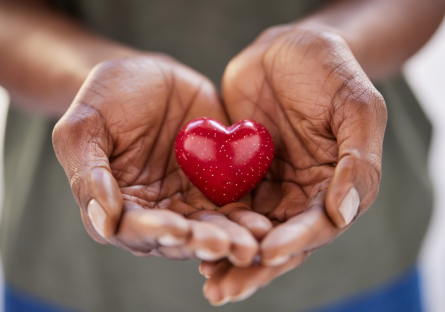This article appears for archival purposes. Any events, programs and/or initiatives mentioned may no longer be applicable.

Happy Valentine’s Day! Today is a day for romance, whispering sweet nothings, and celebrating amour. If you’re lucky enough to feel loved today, take a moment to reflect on those feelings of joy and satisfaction that it brings. Where do they come from? Why does it feel so good to love? Turns out there’s some science behind the magic of Cupid’s arrow! Your brain is full of neurotransmitters that help give you that loving feeling.
The Cuddle Chemical
Your body produces several different hormones that have a powerful physiological effect on our bodies. These hormones help reinforce certain behaviors and, in some cases, work to bond us closer together with other people. One of these, oxytocin, is known as the “love hormone.” Produced by our hypothalamus and secreted through our pituitary gland, oxytocin serves two major functions: in women, the hormone triggers labor, releases breastmilk, and encourages bonding between mother and child; in men, oxytocin helps move sperm.
In addition to these functions, oxytocin acts as a relaxing agent. When oxytocin is released in the body, it lowers anxiety, drops your cortisol (aka stress hormone) levels, improves mood, and creates strong feelings of trust and connection in other people. Oxytocin is the hormone that rewards us for our relationships by giving us a good-feeling jolt of neurochemicals which, in turn, inspire us to be closer to the people who are important to us.
Oxytocin also serves an important role in the bedroom. Sexual activity releases a cocktail of neurotransmitters that include oxytocin, dopamine, and endorphins. Endorphins relieve pain and reduce stress while dopamine acts as a "reward chemical" that soothes the body, generating feelings of happiness and self-satisfaction.
What Causes Oxytocin to Spike
Your body ramps up oxytocin production during certain events. Physical contact with another person is one of the most reliable producers of oxytocin. It doesn't have to be sensual contact, either; a simple hug, cuddle, massage, or even a reassuring touch on the shoulder could produce a relaxing surge of oxytocin. Doing activities with friends like having dinner or playing sports could also give you this feeling, as can spending time with older relatives or your children.
One of the best ways to experience the love hormone is to pet your animals. Petting your dog or cat not only increases your oxytocin levels, but it also does the same thing FOR YOUR PETS. A dog being pet by their owner is also feeling a sudden wave of neurochemical elation in their body. So, if you’re feeling down or you see that your favorite critter is having a bad day, give yourself both a treat by spending a few minutes giving them all the head-scratches and belly rubs you can dish out.
The Sweetness of Serotonin
Oxytocin makes you feel closer to people, endorphins relax you, dopamine rewards you, and serotonin makes you feel really good. Serotonin is another one of the neurotransmitters that can be released during physical contact and/or activity with other people. Serotonin makes you feel “full”: it’s the hormone that has the most impact on your digestive system. That feeling of warm contentment after eating a delicious meal? That’s serotonin. It won’t necessarily make you feel closer to other people in the same ways that oxytocin and dopamine does, but what it will do is make you feel more content and at ease in your skin for a while. Feeling at ease with yourself and at peace is a quality that can be very beneficial in interpersonal relationships, so ensuring you have a steady flow of serotonin in your body by exercising more, getting enough vitamin D in your system through sunlight, and eating foods high in tryptophan (like tofu, turkey, salmon, eggs, and pineapples).
Article by Austin Brietta
Want more wellness tips? Check out these stories: